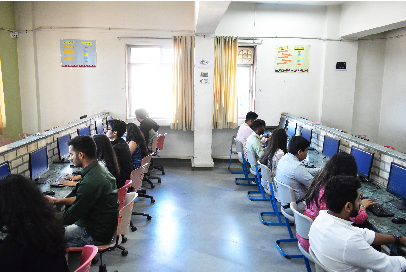Announcement
Get Ready for INDUS CUP 2K26! | Dates: 5–10 January 2026 | Stand a Chance to Win Cash Prizes up to ₹10,00,000!...Read more Get Ready for INDUS CUP 2K26! | Dates: 5–10 January 2026 | Stand a Chance to Win Cash Prizes up to ₹10,00,000!
We are excited to announce the Indus Hackathon 2025, an exhilarating one-day event organized by the CSE Department of Indus University....Read more We are excited to announce the Indus Hackathon 2025, an exhilarating one-day event organized by the CSE Department of Indus University.
26th ISTE Faculty Annual State Convention will be held at Indus University on April 27, 2023....Read more 26th ISTE Faculty Annual State Convention will be held at Indus University on April 27, 2023.
Get Ready for INDUS CUP 2K26! | Dates: 5–10 January 2026 | Stand a Chance to Win Cash Prizes up to ₹10,00,000!...Read more Get Ready for INDUS CUP 2K26! | Dates: 5–10 January 2026 | Stand a Chance to Win Cash Prizes up to ₹10,00,000!
We are excited to announce the Indus Hackathon 2025, an exhilarating one-day event organized by the CSE Department of Indus University....Read more We are excited to announce the Indus Hackathon 2025, an exhilarating one-day event organized by the CSE Department of Indus University.
26th ISTE Faculty Annual State Convention will be held at Indus University on April 27, 2023....Read more 26th ISTE Faculty Annual State Convention will be held at Indus University on April 27, 2023.


Construction project managers trained in project management planning, cost management, time management, quality management, risk management, and safety management, among other skills, are produced through the two-year master's degree in construction project management given by Indus University. The many stages of construction are exposed to prospective students, from planning to designing, budgeting to scheduling, and eventually, building and launching the project. The M.Tech program in Construction Project Management is primarily meant to develop students into strategists who can effectively complete any organization's project's production, commercial, and technological requirements.
Candidates for the M.Tech in Construction Project Management graduate as skilled workers qualified to hold senior engineering and architectural positions in construction engineering and project management. The course's primary goal is to give students the analytical and conceptual skills they need to understand their plans and the projects they are working on.
Indus is a highly sought-after program internationally recognized for student exchanges and internships focusing on professional management practices for construction projects and portfolios. It includes various services during the planning, design, construction and post-construction stages to achieve project objectives such as quality, cost, time and scope management.
Construction managers play a vital role in developing the built environment and infrastructure, ensuring construction projects' efficient and timely implementation. Indus University offers a two-year full-time degree program leading to a Master of Technology in Construction and Management (M. Tech). The purpose of this program is to train engineers and architects to become qualified professionals in civil engineering and project management. Within this program, professional training focuses on the following areas:
Graduates of this Indus Institute of Technology and Engineering M.Tech in Construction Project Management course build successful careers in construction management with leading government and private organizations. Many want to work with significant construction organizations, infrastructure developers and consulting firms in the country and abroad. Some graduates complete PhDs and continue research at the world's leading universities and research institutes. At a time when the infrastructure sector in India is increasing, so are the opportunities for construction professionals.
Indus University's M.Tech (Construction Engineering and Management) program aims to produce excellent construction project managers with advanced teaching techniques and learning facilities in state-of-the-art research facilities. "As the construction industry faces the challenge of COVID-19, its driving factor is automation" to help it regain economic growth. The current uncertain crises are forcing the industry to use technologies to automate workflows and processes, and the early adopters will benefit the most. This course trains students towards the digital transformation of the AEC sector.
Explore our MTech Construction Management program! This course equips you with the expertise and understanding to excel in the industry. Whether it's project scheduling or financial oversight, we have you covered. Our seasoned instructors and practical training experiences ensure that you are fully equipped to address the complexities of overseeing construction projects.
25% of the sanctioned strength of Management & NRI quota will be filled up on the basis of merit as per the eligibility criteria decided by AICTE & Gujarat State Government and procedure laid down by ACPC.
Eligibility
The eligibility criteria are a minimum of 50% marks in B.E./B.Tech with the qualifying GATE Score or State level entrance exam for M.E./M.Tech
Course Duration
2 Years (4 Semesters)
Intake
18 Seats
Research and Problem Solving: The capacity to conduct independent research, investigations, and development work to address real-world issues.
Technical communication skills: These include the capacity to produce and deliver a thorough technical report or document.
Integrated Discipline Knowledge: Exhibit a level of expertise in the subject matter consistent with the program's area of speciality. The level of mastery should exceed the prerequisites for the relevant bachelor programme.
Contemporary tool Utilisation: Develop, pick, and use appropriate methods, resources, and contemporary engineering and IT tools, such as prediction and modelling, to complicated engineering processes while being aware of the constraints.
Ethics: Adhere to professional ethics, obligations, and standards of engineering practice. Apply ethical principles.
Lifelong learning: Understand the necessity of, and possess the skills necessary for, independent lifelong learning in the broadest sense possible in the context of technological progress.
Computational Laboratory:
In civil engineering and related subjects, the majority of real problems are typically the simultaneous combinations of several physical events. To address these issues, the Department has a computational lab with a capacity of about 60 seats, systems updated with modelling software like AutoCAD, Staad Pro V8i, Revit Architecture, Edificius, and project management software like MS Projects, Primavera, and other relevant supporting software.
Workshops, Skill development programmes
Learning presents ongoing challenges in today's environment is crucial to upgrade existing knowledge and create new abilities. For compliance with industry standards, knowledge and skill must be balanced. Workshops & Expert Lectures are conducted with expert speakers from Companies & Research Institutes as well as In-house experts for interaction sessions related to their domains. Such sessions are organized on a regular basis to apprise the students of the current career prospects in different fields of Information, Technology and Research. Mock test series that aim to improve students' aptitude and reasoning skills and familiarize them with the format of various placement and other competitive exams are often organized in order to prepare students for their future careers.
Construction engineers: They specialise in creating structures that can withstand any disaster. Manage the public and private construction projects that are underway.
Construction Inspector: The inspectors frequently examine the construction sites to ensure that the work complies with the rules and standards established by the state and federal governments.
Professor: Civil or construction engineers have the option of pursuing a career in academia.
Indus University has an autonomous vertical - Training & Placement Department (T & P Dept.) - that connects two vital ends: education and the industry. It exemplifies a link between schools and university constituent associations (entry-level input) and the sector (output-end at the finishing level).
The Training and Placement Department was established in 2006. It was previously affiliated with the Indus Institute of Technology & Engineering until becoming a part of the Indus University in 2012.
The Training and Placement Department is the hub for career assistance for students from all programmes and streams at the university. It provides students with overall career solutions by encouraging them to choose and pursue their ideal vocations.
25% of the sanctioned strength of Management & NRI quota will be filled up on the basis of merit as per the eligibility criteria decided by AICTE & Gujarat State Government and procedure laid down by ACPC.
Eligibility
The eligibility criteria are a minimum of 50% marks in B.E./B.Tech with the qualifying GATE Score or State level entrance exam for M.E./M.Tech
Course Duration
2 Years (4 Semesters)
Intake
18 Seats
Research and Problem Solving: The capacity to conduct independent research, investigations, and development work to address real-world issues.
Technical communication skills: These include the capacity to produce and deliver a thorough technical report or document.
Integrated Discipline Knowledge: Exhibit a level of expertise in the subject matter consistent with the program's area of speciality. The level of mastery should exceed the prerequisites for the relevant bachelor programme.
Contemporary tool Utilisation: Develop, pick, and use appropriate methods, resources, and contemporary engineering and IT tools, such as prediction and modelling, to complicated engineering processes while being aware of the constraints.
Ethics: Adhere to professional ethics, obligations, and standards of engineering practice. Apply ethical principles.
Lifelong learning: Understand the necessity of, and possess the skills necessary for, independent lifelong learning in the broadest sense possible in the context of technological progress.
Computational Laboratory:
In civil engineering and related subjects, the majority of real problems are typically the simultaneous combinations of several physical events. To address these issues, the Department has a computational lab with a capacity of about 60 seats, systems updated with modelling software like AutoCAD, Staad Pro V8i, Revit Architecture, Edificius, and project management software like MS Projects, Primavera, and other relevant supporting software.
Workshops, Skill development programmes
Learning presents ongoing challenges in today's environment is crucial to upgrade existing knowledge and create new abilities. For compliance with industry standards, knowledge and skill must be balanced. Workshops & Expert Lectures are conducted with expert speakers from Companies & Research Institutes as well as In-house experts for interaction sessions related to their domains. Such sessions are organized on a regular basis to apprise the students of the current career prospects in different fields of Information, Technology and Research. Mock test series that aim to improve students' aptitude and reasoning skills and familiarize them with the format of various placement and other competitive exams are often organized in order to prepare students for their future careers.
Construction engineers: They specialise in creating structures that can withstand any disaster. Manage the public and private construction projects that are underway.
Construction Inspector: The inspectors frequently examine the construction sites to ensure that the work complies with the rules and standards established by the state and federal governments.
Professor: Civil or construction engineers have the option of pursuing a career in academia.
Indus University has an autonomous vertical - Training & Placement Department (T & P Dept.) - that connects two vital ends: education and the industry. It exemplifies a link between schools and university constituent associations (entry-level input) and the sector (output-end at the finishing level).
The Training and Placement Department was established in 2006. It was previously affiliated with the Indus Institute of Technology & Engineering until becoming a part of the Indus University in 2012.
The Training and Placement Department is the hub for career assistance for students from all programmes and streams at the university. It provides students with overall career solutions by encouraging them to choose and pursue their ideal vocations.
What does M.Tech inConstruction Project Management cover?
The construction industry needs graduates who can be effective for such projects due to increased awareness of the necessity to develop infrastructures so that they satisfy the requirements for convenience and promote barrier-free standards of living. So, definitely, a degree has better potential for the future.
What does an M.Tech in Construction Project Management engineer make?
Starting salaries range from INR 15,000 to 25,000, and they increase as one gains experience and understanding.
What is the duration of M.Tech in Construction Project Management?
M.Tech in Construction Technology is a two-year programme with four semesters.
Is M.Tech in structural engineering and construction project management similar?
Although the overall idea of both engineering bodies is essentially the same, each institute may have a different semester-by-semester syllabus, examination format, and selection criteria.